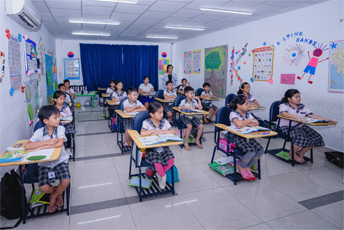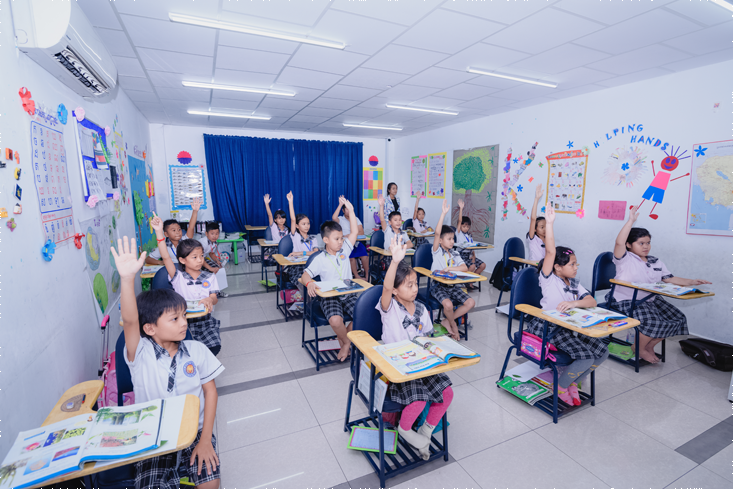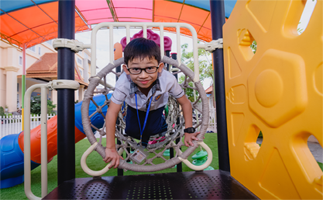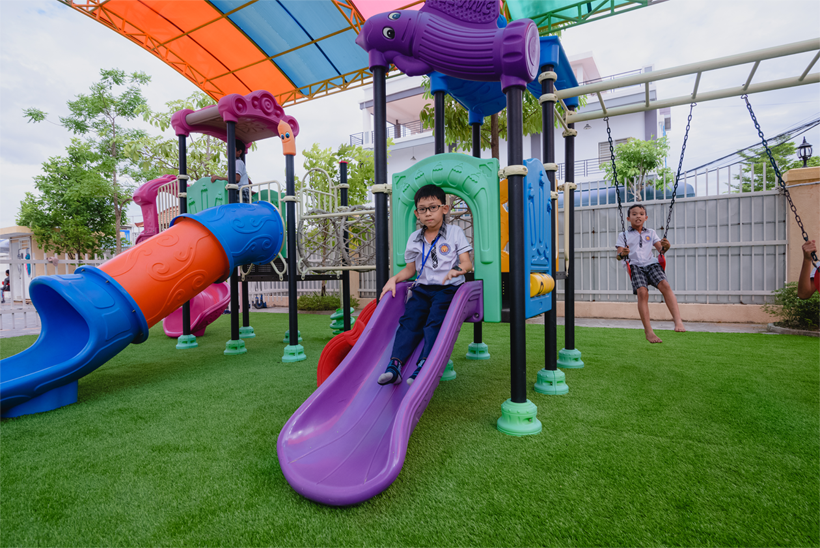Primary Curriculum
From 1st- 6th grade, we offer each and every student an education emphasized on various subjects. The primary curriculum focuses on preparing student for academic challenges and moral virtues, as well as cultivating position character. Students will be able to expand their knowledge through enrichment activities/classes that will allow them to reach new heights.
|
No |
Subjects |
Language |
|
|
1 |
Art-Drawing |
Khmer |
|
|
2 |
Art-Music |
Khmer |
|
|
3 |
Computer |
English |
|
|
4 |
English for communication |
English |
|
|
5 |
Core English |
English |
|
|
6 |
Mathematics |
English |
|
|
7 |
Health Education |
English |
|
|
8 |
Social Study |
English |
|
|
9 |
Science |
English |
|
|
10 |
Khmer Language |
Khmer |
|
|
11 |
Library |
English |
|
|
12 |
Mathematics |
Khmer |
|
|
13 |
Physical Education |
English |
|
|
14 |
Science/ Social |
Khmer |
|
|
15 |
Local Life Skills Program. |
Khmer |
Comprising of 15 subjects, 8 areas of education have been focused with the specific aims below.
The aims of Art Education are:
- to value the child’s confidence and self-esteem through valuing self-expression
- to enable the child to develop natural abilities and potential, to acquire techniques, and to practice the skills necessary for creative expression and for joyful participation in different art forms
- to enable the child to see and to solve problems creatively through imaginative thinking and so encourage individuality and enterprise
The aims of the music education are
• to enable the child to enjoy and understand music and to appreciate it critically
• to develop the child’s openness to, awareness of and response to a wide range of musical genres
• to develop the child’s capacity to express ideas, feelings and experiences through music as an individual and in collaboration with others
• to enable the child to develop his/her musical potential and to experience the excitement and satisfaction of being actively engaged in musical creativity
• to nurture the child’s self-esteem and self-confidence through participation in musical performance
• to foster higher-order thinking and lifelong learning through the acquisition of musical knowledge, skills, concepts and values
• to enhance the quality of the child’s life through aesthetic musical experience
The aims of two languages education are:
- create, foster and maintain the child’s interest in expression and communication both in Khmer and English
- develop the child’s ability to engage appropriately in listener-speaker relationships
- develop confidence and competence in listening, speaking, reading and writing
- develop cognitive ability and the capacity to clarify thinking through oral language, writing and reading
The aims of social, personal and health education are:
- to promote the personal development and well-being of the child
- to foster in the child a sense of care and respect for himself/herself and others and an appreciation of the dignity of every human being
- to promote the health of the child and provide a foundation for healthy living in all its aspects
- to enable the child to make informed decisions and choices about the social, personal and health dimensions of life both now and in the future
- to develop in the child a sense of social responsibility, a commitment to active and participative citizenship and an appreciation of the democratic way of life
- to enable the child to respect human and cultural diversity and to appreciate and understand the interdependent nature of the world.
The aims of science education are:
• to develop knowledge and understanding of scientific and technological concepts through the exploration of human, natural and physical aspects of the environment
• to develop a scientific approach to problem-solving which emphasizes understanding and constructive thinking
• to encourage the child to explore, develop and apply scientific ideas and concepts through designing and making activities
• to foster the child’s natural curiosity, so encouraging independent enquiry and creative action
• to help the child to appreciate the contribution of science and technology to the social, economic, cultural and other dimensions of society
• to cultivate an appreciation and respect for the diversity of living and non-living things, their interdependence and interactions
• to encourage the child to behave responsibly to protect, improve and cherish the environment and to become involved in the identification, discussion, resolution and avoidance of environmental problems and so promote sustainable development
• to enable the child to communicate ideas, present work and report findings using a variety of media.
The aims of Mathematics education are:
- to enable the child to use mathematical language effectively and accurately both in Khmer and English
- to enable the child to acquire an understanding of mathematical concepts and processes to his/her appropriate level of development and ability
The aims of the physical education are
• to promote the physical, social, emotional and intellectual development of the child
• to develop positive personal qualities
• to help in the acquisition of an appropriate range of movement skills in a variety of contexts
• to promote understanding and knowledge of the various aspects of movement
• to develop an appreciation of movement and the use of the body as an instrument of expression and creativity
• to promote enjoyment of, and positive attitudes towards, physical activity and its contribution to lifelong health-related fitness, thus preparing the child for the active and purposeful use of leisure time
The aims of Local Life Skill Education are:
- to equip students with knowledge and self-development skills
- to make the students think, analyze, discuss, and find solutions as much as possible so that students gain knowledge and capacity from all aspects
- to become good citizens, skilled workers, and learn to live together
- to study the theory in advance and later on put the theory into practice by linking it to their everyday lives so that they obtain real skills and capacity









